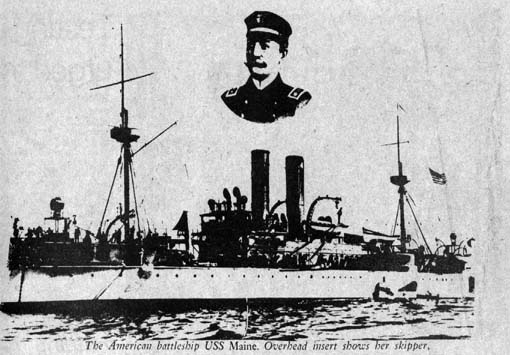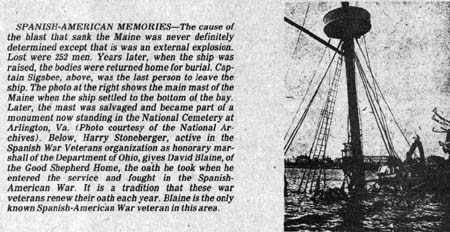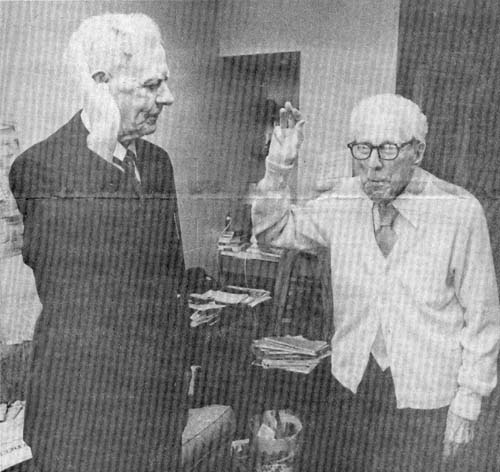April 27, 1978



THE WAR WITH SPAIN – 1898
Today’s story has a two-fold purpose: (1) to pay tribute to those men who took part in the Spanish-American War (2) to remind readers what that war was all about.
Most readers know more about World War I and II than about the Spanish- American War…perhaps because it was of short duration; and it was not a costly war like later ones.
Historically, in the last part of the 19th century, Spain controlled the Philippines, also Guam, Cuba and Puerto Rico. Spain began conquest of Cuba in 1511. As Cuba grew the Spanish overlords practiced greed in their treatment of the people and as a result there was periodic revolt.
HUMAN RIGHTS
The same practice of mistreatment of the people was prevalent in the Philippines. During Grover Cleveland’s presidency (1893-1897), the objected strenuously to Spain and was told not to interfere. The American people were angered with the situation. The belief in “human rights” prevalent today in the United States, existed then too.
During William McKinley’s presidency (1897-1901 the mistreatment of the people in Spanish possession continued.
February 15, 1898, the U.S. Battleship Maine, was blown up in the Havana, Cuba, harbor. McKinley tried to avoid war…he delivered a message on neutral intervention in April, 1898. Congress declared that Spain should be punished, and voted for the liberation and independence of Cuba. War was declared April 21 against Spain.
SPANISH FLEET DESTROYED
On May 1, 1898, Commodore Dewey, with an American fleet, sailed into Manila Bay, the Philippines and destroyed the Spanish fleet anchored there. The city surrendered, and when peace was finally made the island was kept by the U.S. and Spain was paid $20,000,000.
June 22, 1898, American troops landed on Cuban soil, and battles were fought near Santiago. At about the same time, a Spanish fleet that was anchored in the harbor of Santiago attempted to escape the blockade of the American fleet. A running fight took place. Under the command of Commodore W.T. Sampson, the American fleet completely destroyed the Spanish fleet, either sinking or setting fire to all their ships. In a short while Cuba, also Puerto Rico was in the hands of the United States. The war with Spain lasted only 100 days.
The highlight of Dewey’s victory at Manila was that Spain lost 11 ships and 381 men, or 19 percent of their total force. Their casualties on shore were 175 men.
U.S. SHIPS UNSCATHED
On the otherhand not a man was lost of the American fleet, nor was any ship disabled…thus making the battle of Manila one of the most remarkable of naval victories.
At Cuba, one of the best known victories for the Americans became known as the famous “charge up San Juan Hill”, under the leadership of Theodore Roosevelt and his “rough riders”. In that encounter the U.S. in three days of fighting lost 22 officers and 208 men killed, 81 officers and 1,203 wounded and 79 missing. The Spanish losses were more than 1,500 officers and men killed and wounded.
CUBAN SETTLEMENT
The finality to the Cuban story is that in 1901 the U.S. offered them control of their government if they would agree to five points:
1. Make no treaties with foreign powers which would hurt the U.S.
2. The U.S. would have right to preserve order if their government failed.
3. They were not to go deeply into debt.
4. Provide the U.S. shore storage for coal for warships.
5. Ports to be kept clean to eradicate yellow fever.
In 1902, Cuba agreed to the U.S. proposal, formed a constitution, elected officials and became self-governing.
USWV FORMED 1904
The same national spriti that prevailed among veterans of all of the wars in which the U.S. participated came to life after the Spanish-American War with the formation of the United Spanish War Veterans in 1904.
The Department of Ohio USWV was formed April 18, 1904. It has provided five national Commanders-in Chief: Charles R. Miller, 1906; Charles F. Cramer, 1914; Albert D. Alcorn, 1923; Edward S. Mathias, 1930; Charles R. Barefoot, 1948; George B. Schiller, senior Vice commander, who would have became head of the organization in 1976 was unable to attend the annual meeting and died Sept. 27, 1977. Currently, the USWV commander-in-cheif is Charles A. Bunnel, Norfolk, Conn., and the adjutant commander is Mrs. Beulah Cope, Washington, D.C.
Currently only 32 state departments remain operational, with 127 camps. As of the last national convention in 1977 only 202 regular members and 23 members at large comprise the once large USWV organization.
OATH REAFIRMED
Each year on April 21, the day war was declared against Spain, living members of the USWV are required to take the oath they took when they entered the service of their country in 1898: “I do solemnly swear that I will bear true allegiance to the United States of America; that I will defend them against all their enemies whomsoever; that I will obey the orders of the President and the officers and non-commissioned officers appointed over me according to the rules and articles of war”.
Fostorian Harry Stoneberger, active in the USWV for many years, was named honorary marshal of the Department of Ohio in 1970 and has been reappointed each succeeding year. He was elected adjutant-quartermaster of Fostoira’s General Poland Camp 44 in 1955, to serve during the lifetime of the camp. He will administered the oath of allegiance to David M. Blaine, who was a member of Company A 5th OVI, and now a resident at Good Shepherd. Blaine is one of only nine survivors in Ohio…each year a few more pass on.
There were many men from the Fostoria area that participated in the war with Spain. Readers may find in the following list the names of ancestors who took part in the short lived war.
F.P. Culp, H.F. Noble, A.E. Robinson, J.B. McMeen, R.L. Smith, F.S. Vosburg, C. Hollopeter, R.O. Nichols. L.A. Briner, O. Bachar, T.M. Lea, C.P. Both, V.W. Stewart, C.A. Woolf, J.A. Bowe, W.C. Ball, C.W. Ramsbottom, A.J. Fletcher, N.E. Hazen, C. Smith, W.H. Lancaster, H.T. Blosser, A.W. Tallman, W. Yochum, O.B. Weber, G.E. Adams, Lafer J. Alley, E.M. Alley, J.L. Alley, L.G. Bly, W.J. Blair, J.A. Burkel, C. Corl, W.E. Cook, J.F. Connelly, A. Cupps, T.W. Davis, F. Dutcher, C.G. Doe, T.E. Duffy, R.C. Ernest, E.E. Engstrom, C.W. Foster, A. Fraver, F.N. Fullerton, J.K. Gollmer, R.D. Heacox, O.F. Hammond, J.A. Huth, L. Jones, T.L. Jones, C. Lorah, A. McClead, R.G. Miller, C.N. Newcomb, J.T. Norton, O.L. Overmeyer, W.L. Riedel, E.L. Riedel, A. Smith, G. Steingraber, B. Singer, L.L. Short, D.D. Schlatter, M.M. Shoemaker, O.D. Wickerd, O.C. Wilson, L.T. Yates, R.M. Lance, E.G. Everett, F.J. Troutman, F.E. Green, J.F. Culbertson, W.D. Andes, A.M. Culp, M.M. Singer, Lewis Wolf, W.H. Sinclair, G.W. Cunningham, E.A. Bricker, E.J. Lancaster, O.F. Boyd, W.W. Dale, R.J. Kistner, A. Slusser, Claire Shaffer, E.E. Waggoner, Leonard Vogel, R.H. Chilcote, W.R. McFarland, A.H. Blinn, E. Hartline, Dr. W.H. Pelton, Guy Frankfather, B. Singer, Jacques Gerlinger.
BLOOMDALE
Edward S. Bryant, Wallce B. Douglas, Guy H. Snyder, Frank Simon, Archie M Fasig, Joh P. Beam, James W. Smith, Willis E. Simon, Lauder V. Robbins, Harry E. Shelt, Walter S. Fasig, William H. richard, John J. Enos, Guy H. Dicken, David L. Miller, Scott E. Rosendale, John M. Stecker, Thomas E. Diehl, Boyd E. Campbell, Thomas Loman, Abram Cline, Irwin Brandeberry, James E. Brown, James T. Bushong, Milo M. Brown, Wilbert Caldwell, Earl Frankfather, Guy Frankfather, Delos Fry, Wayne Fry, Ross Fry, Stanley B. Gale, John W. Hamlin, Franklin A. Hamlin, Milton Karn, Henry N. Krieger, Charles E. Karrick, Allan Loman, Jesse L. Miller, Redmond B. Monroe, James B. Mapes, Charley F. Miller, Rolla G. Ruab, Thomas B. Rosendale, Charles B. Skinner, Milton H. Snyder, Dwight E. Simon, Samuel M. Cramer.